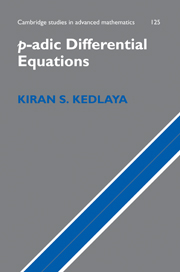Book contents
- Frontmatter
- Contents
- Preface
- 0 Introductory remarks
- Part I Tools of p-adic Analysis
- Part II Differential Algebra
- Part III p-adic Differential Equations on Discs and Annuli
- Part IV Difference Algebra and Frobenius Modules
- Part V Frobenius Structures
- 17 Frobenius structures on differential modules
- 18 Effective convergence bounds
- 19 Galois representations and differential modules
- 20 The p-adic local monodromy theorem
- 21 The p-adic local monodromy theorem: proof
- Part VI Areas of Application
- References
- Notation
- Index
21 - The p-adic local monodromy theorem: proof
Published online by Cambridge University Press: 05 August 2012
- Frontmatter
- Contents
- Preface
- 0 Introductory remarks
- Part I Tools of p-adic Analysis
- Part II Differential Algebra
- Part III p-adic Differential Equations on Discs and Annuli
- Part IV Difference Algebra and Frobenius Modules
- Part V Frobenius Structures
- 17 Frobenius structures on differential modules
- 18 Effective convergence bounds
- 19 Galois representations and differential modules
- 20 The p-adic local monodromy theorem
- 21 The p-adic local monodromy theorem: proof
- Part VI Areas of Application
- References
- Notation
- Index
Summary
In this chapter we give a proof of the p-adic local monodromy theorem, at the full level of generality at which we stated it (Theorem 20.1.4). After some initial reductions, we start with the case of a module of differential slope 0, i.e., one satisfying the Robba condition. We describe how this case can be treated using either the p-adic Fuchs theorem for Christol–Mebkhout annuli (Theorem 13.6.1) or the slope filtration theorem of Kedlaya (Theorem 16.4.1). We then treat the rank 1 case using the classification of rank 1 solvable modules from Chapter 12. We then show that any module of rank greater than 1 and prime to p can be made reducible, by comparing the module with its top exterior power and using properties of refined differential modules. We finally handle the case of a module M of rank divisible by p by considering M∨ ⊗? M instead.
The reader may notice some similarities to the proof of the Turrittin–Levelt–Hukuhara decomposition theorem (Theorem 7.5.1). In fact, this theorem is also known as the p-adic Turrittin theorem for this reason.
Besides the running hypothesis for this part of the book (Hypothesis 14.0.1) and the hypothesis from the previous chapter (Hypothesis 20.0.1), it will be convenient to set several more hypotheses.
Running hypotheses
We are going to make a number of calculations under the same hypotheses. Rather than repeat the hypotheses each time, we enunciate them once and for all here.
- Type
- Chapter
- Information
- p-adic Differential Equations , pp. 338 - 344Publisher: Cambridge University PressPrint publication year: 2010



